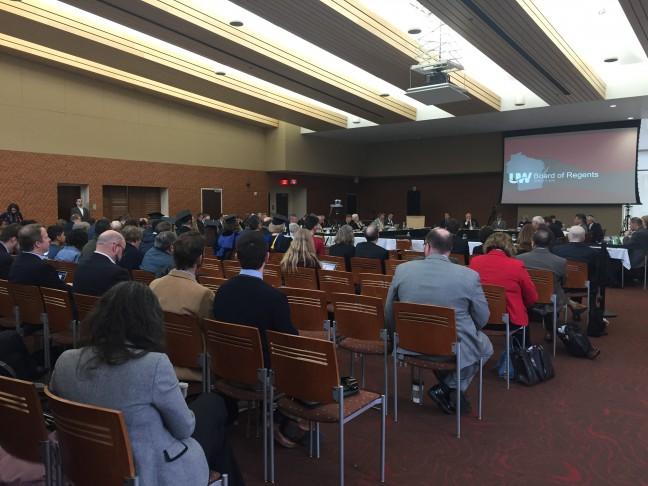The University of Wisconsin System’s tenure policies will shift to what some professors have dubbed “fake tenure” after a Board of Regents vote on three policies in Madison Thursday.
My few colleagues protesting at the end of #uwtenure vote. #faketenure pic.twitter.com/ZfbEdQEmPi
— Karma Chávez (@queermigrations) March 10, 2016
After the 2015-17 biennial budget removed tenure from state statutes, the UW System formed a task force to come up with new tenure policies for the system. The regents on Thursday approved a slightly amended version of the task force’s recommendations.
The passed policies will now allow UW institutions to fire tenured faculty members due to “budget or program changes” rather than just financial reasons, and determines the procedures to laying off a faculty member. It also requires departments to conduct reviews on tenured faculty every five years.
“Program changes,” according to the draft’s languages, include “program discontinuance, curtailment, modification or redirection.” The resolution states that the only new reason faculty can be laid off is for “program discontinuance” specifically.
The language in the new policies incited debate between regents on what exactly “program discontinuance” entailed.
Regent Drew Petersen spoke on the strengths of the proposed policies.
“We must as a group restore faith in the tenure system,” Petersen said. “We owe it to our future students to guarantee them access to the best and brightest faculty we can find. We believe these proposed changes will provide stronger protection for academic freedom and will ensure tighter tenure policy will be comparable to those of our peers.”
https://twitter.com/noelradomski/status/708033915932581888
But some regents argued against the proposed tenure policies, saying they limit academic freedom and allow administration to more easily fire faculty.
Regent Tony Evers proposed several amendments that changed the language of the drafts to make them more sympathetic toward faculty concerns and to comply with American Association of University Professors recommendations. One amendment would edit a policy that says faculty may be laid off “only in extraordinary circumstances and after all feasible alternatives have been considered,” changing the word “considered” to “pursued.”
Regent Mark Bradley said the word “pursued” is industry standard, and the word “considered” sends a message to faculty that UW’s stance on tenure is weak. AAUP agreed in a statement, saying the Board of Regents’ new policy “provides weaker protections of tenure, and thus of academic freedom, than what has long been the norm in Wisconsin.”
Regent Eve Hall said the word “considered” is adequate to allow chancellors to be “flexible” in their decisions.
The amendment received an 8-8 tie among regents and did not pass.
https://twitter.com/djvanness/status/708138429784023040
Evers’ two other amendments suggested decreasing the role of financial reasons, and instead pushed educational value, when deciding whether to terminate an academic program. Evers said that in the “business of education,” education should be a priority. His proposed changes were voted down.
UW Chancellor Rebecca Blank said she would have preferred to see Evers’ amendments pass.
Chancellor Blank (Madison): I support proposals of faculty reps, would have preferred they be adopted
— Nick Fleisher (@nickfleisher) March 10, 2016
Board of Regents President Regina Millner said she does not view academia like a business, but there is a need for a sound financial system. Policies should allow chancellors to be flexible, she said.
A few thoughts on the demise of #UWTENURE tonight as I think of my loved ones… for that is really how I think of my UW colleagues.
— Sara Goldrick-Rab (@saragoldrickrab) March 11, 2016
Regent José Vásquez opposed every policy when it came to a vote.
“It was not tenure that caused the fiscal crisis. It has been imposed on us,” Vásquez said. “The state must come to understand what it means to be a public institution.”
The Board of Regents passed all three pieces of the new tenure policy on a voice vote.
During the meeting, student members of the Black Out organization protested racist acts on UW System campuses and standardized testing, which they said prompts racial inequality in the UW System.
https://twitter.com/donmoyn/status/708000090112331776
Ally Adams, a sophomore at UW and protesters, addressed Millner about the importance of bringing a more diverse community of students to the UW System.
“We want to bring to the Board of Regents’ attention that students who come from low-income backgrounds, mostly students of color, don’t have the resources to prepare for these rigid standardized tests required to get into higher levels of education,” Adams said. “It is another facet of systematic oppression we, people of color, face.”
The Black Out organization also called out specific acts of racism, such as racism against Native American students on campus and the statistic that 47 percent of Native American women have been victims of sexual assault.
https://twitter.com/djvanness/status/707956752311033857
Protesters requested a public apology to people of color and asked the UW System to create and enforce comprehensive racial awareness into the curriculum and training of students and staff. They also demanded a reevaluation of the tenure plan that addresses diversity.
Millner said the regents have been initiating a system-wide exploration of the campus climate.
“These conversations have been taking place and will continue to take place because they are important for our students to feel a sense of comfort in their campuses,” she said.
The next regents meeting will be April 7 in Green Bay.


